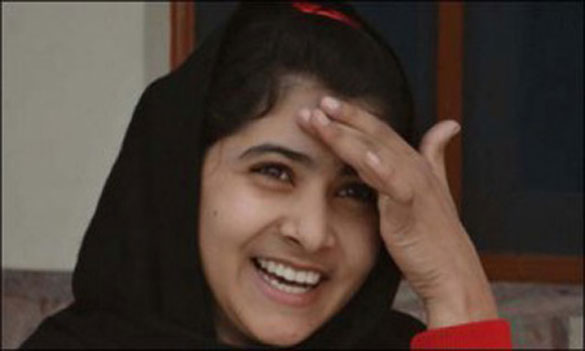A Feminist Reading of the Quran
By Ruby Hamad
October 22, 2012

Malala Yousafzai
--------
Yousafzai first attracted the group's ire for her insistence on the right of girls to be educated. At the age of 11, she gained international recognition for her BBC blog, in which she documented Taliban atrocities as they burned girls’ schools to the ground.
Following Yousufzai’s shooting earlier this month, the Taliban released a statement claiming, 'We did not attack her for raising voice for education. We targeted her for opposing Mujahideen (holy warriors) and their war.'
And so, the Taliban continues to paint Islam as an inherently violent religion.
Muslims are required to model their lives on that of the prophet Mohammed. Consequently, it is easy to assume the roots of radical Islam can be traced back to the prophet himself, hence the numerous Western depictions of Mohammed as an intolerant, murderous tyrant. Such depictions have no basis in history.
Mohammed was trying not just to introduce a new faith, but to transform Arabian society. He blamed much of Arabia's ills on the concept of Jahiliya. Referred to as the 'Time of Ignorance' by Muslims to denote pre-Islamic times, Jahiliya, according to historian Karen Armstrong, is better translated as 'irascibility', an 'acute sensitivity to honour and prestige; arrogance, excess, and ... a chronic tendency to violence and retaliation'.
In establishing an inclusive Muslim community (ummah), Mohammed sought to overcome the tribal ethos that had led to customs such as lethal retaliation for perceived transgressions, honour crimes and blood feuds, and whose patriarchal nature bred violence against women including wife beating, forced marriages and female infanticide, all of which Mohammed condemned.
Indeed women had such low standing it is not surprising that, after hearing Mohammed declares women's rights to inherit property and determine who and when they marry, women were among his earliest converts. For this, Mohammed was ridiculed for mixing with the 'weak'.
In his final sermon to the ummah near Mount Arafat, an ailing Mohammed seemed to wonder how his legacy would be fulfilled. 'O people, have I faithfully delivered my message to you?' he cried.
Sadly, it is Jahiliya that one sees in much of the Muslim world today. It is in Pakistan's ludicrous blasphemy laws, and it rears its ugly head every time fanatical preachers whip young men into a frenzy demanding they 'defend' the prophet's honour whenever the West is accused of insulting him.
But mostly, it can be seen in the way Muslim women's rights are being increasingly eroded. Mohammed accepted the taunts from other men (some of them Muslim converts) for what they thought was his too lenient treatment of women. In his day, as in ours, the advancement of women was seen as a rebuke to the supremacy of men.
The Taliban's claim that they did not target Malala for her stance on education rings hollow considering their history. Another of their targets, Sakena Yacoobi, founder of the Afghan Institute of Learning (AIF) has been surreptitiously educating girls in Afghanistan and Pakistan since the 1990s. 'Every day there is a death threat', Yacoobi tells journalists Nicholas Kristoff and Sheryl WuDunn in Half the Sky, a remarkable book that documents human rights abuses against women and girls around the globe, and describes how women are fighting back.
For fundamentalists who view women only as wives and mothers, education is a threat because educated women are more likely to delay marriage and pregnancy, and to have fewer children. With increased financial independence, they are also less likely to accept their inferior role in society.
Education, as Yacoobi discovered, also leads to a fresh understanding of the Quran. As well as advising women on their legal rights in civil and Islamic law, Yacoobi encourages women to show to their husbands verses in the Quran that call for respect for women. Often, both men and women are shocked to learn that such verses exist.
These verses prompt calls for a feminist interpretation of the Quran that rejects gender segregation and its inherent bias against women. Mohammed's vision of gender equality was so far ahead of its time it was completely misunderstood, and for centuries, women have accepted the fallacy that they are inferior to men.
Muslim women are the key to a Muslim renaissance and it is women like Yousafzai and Yacoobi who are the inheritors of Mohammed's legacy. Hostility to education has no basis in Mohammed's vision. How can it when the first verse in the Quran commands, 'Read. Read in the name of your lord'?
Ruby Hamad is a Sydney writer and associate editor of progressive feminist website The Scavenger.
Source: http://www.eurekastreet.com.au/article.aspx?aeid=33701
URL: https://newageislam.com/islam-women-feminism/a-feminist-reading-quran/d/9077
